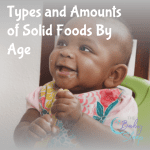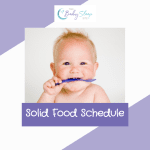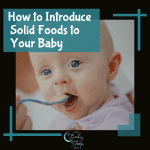
In a perfect world, everything related to feeding your baby solid foods would be…well…perfect. You’d have all the best products and tools to make feeding a cinch. Your baby would fall in love with every single vegetable you offered her. Meals would be lots of fun and no (or at least a little) mess.
We can dream, right?
Feeding may be that perfect some of the time, but then life happens. Your little one gets sick and refuses to eat. Your baby food maker suddenly breaks. Baby decides she now hates sweet potatoes (even though she loved them last week) and throws a big, juicy handful right at your face.
Here’s another “life happens” moment that you may be experiencing right now — teething. After all, teething seems like a near-constant problem, doesn’t it? Baby teeth start coming in somewhere between 4-6 months, and most kids have all their baby teeth by age 3. Sprouting 20 teeth in 2.5 years — no wonder it seems like your baby is always teething!
Physical Symptoms of Teething
Teething has lots of physical effects on your baby. Teething might be causing her to drool more (which can lead to a rash on her cheeks and neck). You may notice that she’s fussier than normal, and is trying to chew on her fingers or toys; this is all related to the painful pressure that the teeth are causing as they try to push through her gums.
Teething can also cause your baby to refuse solid food and/or have diarrhea, or even to develop a low-grade fever (although doctors are divided on whether or not teething is actually to blame for those symptoms). Of course, teething can also impact her attitude, turning your happy little girl into a fussy, cranky mess.
Finally, teething can impact sleep. Babies who are uncomfortable tend to wake more frequently and sleep less. So if your little one’s teething, be prepared to wake up in the middle of the night to the sound of a weepy baby!
How Teething Affects Appetite
Much like illness, teething can have a really negative impact on a baby’s appetite. Most babies who are teething tend to eat less solid food and take in less breastmilk or formula. You may notice that your baby isn’t eating his usual amount of food at each meal, or even that he skips entire meals. You may also find that he turns away from the bottle or the breast before he’s had a full feed, or that he rejects the bottle or breast altogether.
This can be alarming! After all, our babies need to eat! But in general, this little “hunger strike” isn’t anything to get worried about. Most babies adjust relatively quickly to the pain of teething (anywhere from a few hours to a few days), so your baby’s appetite will most likely return to normal soon. In the meantime, just continue offering her solid foods and breastmilk or formula as you normally would.
Sometimes, though, the problem can become more serious. If your baby goes several days without eating much of anything, or if you suspect that he’s becoming dehydrated (because he’s producing fewer and fewer wet diapers), be sure to contact your baby’s pediatrician.
Easy Ways To Treat Teething At Home
There’s no way to speed up the teething process, unfortunately, or to completely eliminate your baby’s pain. But there are some easy things you can do to help ease her discomfort; that, in turn, might encourage her to eat and drink a little better.
Try these natural remedies for teething pain:
- Offer a teething ring. You can pick these up almost anywhere. the best teething products are soft enough to give a little when baby bites down, but firm enough to create pressure on her gums (that pressure counteracts the upward pressure from the teeth below the gums, which can ease the pain a bit.) Some even include a gel that, when refrigerated, cools to numb the gums.
- Offer food as a teether. Don’t want to buy a teething ring? No problem; you can probably make your own teether using things you already have in your kitchen! Try freezing a banana and then handing the whole thing to your baby (just remember to wrap one end in a paper towel or washcloth, so it’s not too cold to hold.) Celery’s another great all-natural teether; my oldest son always liked chewing on celery stalks straight from the fridge when he was teething.
- Offer a gum massage. You can massage the swollen parts of your baby’s gums (those’ll be where the teeth come through pretty soon!) Again, that counterpressure will help relieve her pain a bit.
- DON’T offer topical gels, like Baby Orajel. In 2011, the FDA issued a safety announcement urging parents to stop using Baby Orajel to relieve teething pain. Turns out Benzocaine (the active ingredient in Orajel and other products like it) can cause a rare but serious condition called methemoglobinemia. Check out this article on the FDA’s website for more information.
- Talk to your baby’s doctor about offering pain relieving medication. Pain relievers like acetaminophen and ibuprofen can ease the pain of teething, but check with your baby’s doctor before using them. While you’re there, you can also ask your pediatrician about using essential oils for teething pain.
Everything You Need To Know About Starting Solids – All In One e-Book!
 What if you could find everything you needed to know about starting your baby on solid foods – when it’s best to start solids, how to introduce solids, complications, food allergies, etc. – in one easy-reference guide? Now you can! Your Baby’s Start To Solid Foods: A Comprehensive Guide will walk you through every step of starting solids. Plus, your e-Book package includes several bonus materials, designed to maximize your success in starting solids. You’ll get a thorough guide to treating constipation, a dietitian’s advice on how to avoid 5 common solid food mistakes, and a weekly meal plan for your baby’s first year. Grab your e-Book today, and ensure your baby has the healthiest possible start to solid foods!
What if you could find everything you needed to know about starting your baby on solid foods – when it’s best to start solids, how to introduce solids, complications, food allergies, etc. – in one easy-reference guide? Now you can! Your Baby’s Start To Solid Foods: A Comprehensive Guide will walk you through every step of starting solids. Plus, your e-Book package includes several bonus materials, designed to maximize your success in starting solids. You’ll get a thorough guide to treating constipation, a dietitian’s advice on how to avoid 5 common solid food mistakes, and a weekly meal plan for your baby’s first year. Grab your e-Book today, and ensure your baby has the healthiest possible start to solid foods!








